人教版(2019) 必修第一册 Unit 5 Languages Around the World 单元复习课件-(16张ppt)
文档属性
| 名称 | 人教版(2019) 必修第一册 Unit 5 Languages Around the World 单元复习课件-(16张ppt) | 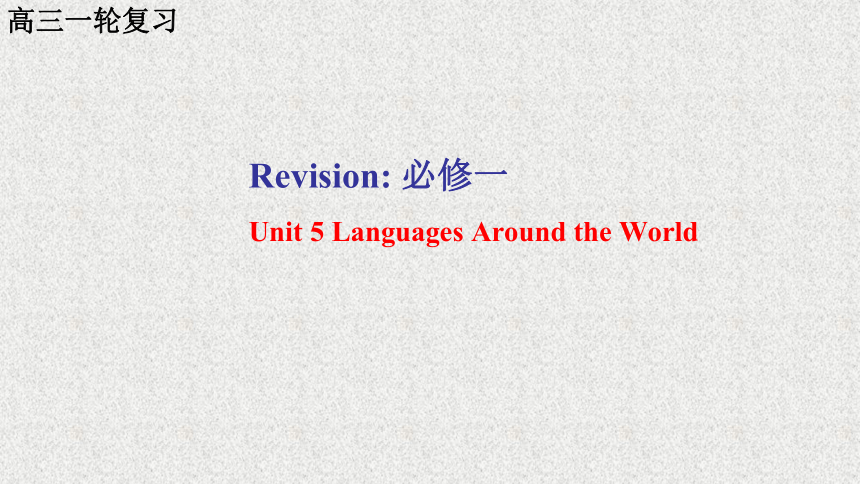 | |
| 格式 | pptx | ||
| 文件大小 | 10.7MB | ||
| 资源类型 | 教案 | ||
| 版本资源 | 人教版(2019) | ||
| 科目 | 英语 | ||
| 更新时间 | 2022-10-20 22:26:35 | ||
图片预览

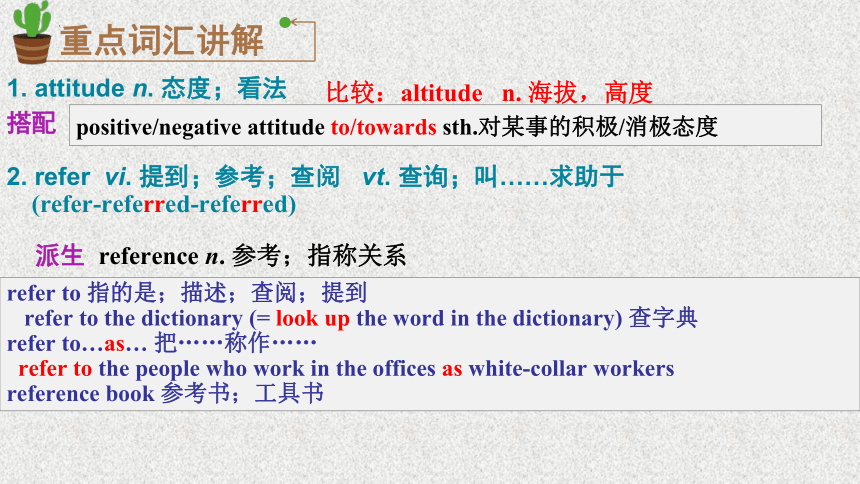
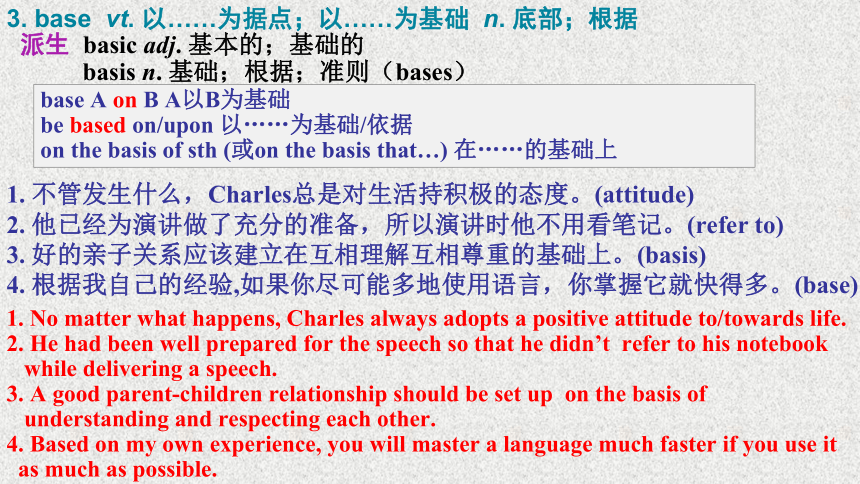
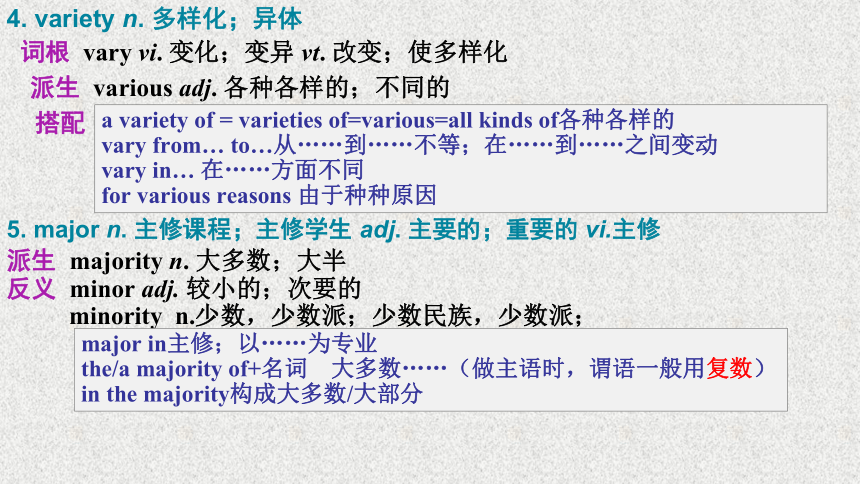
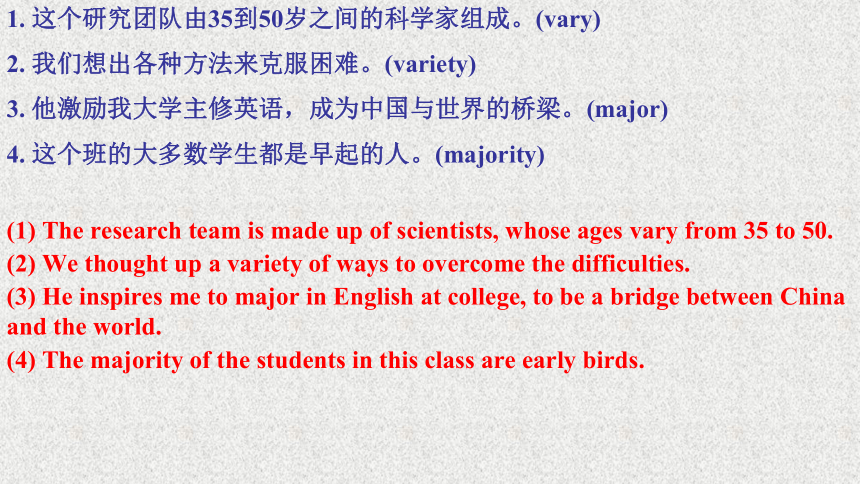
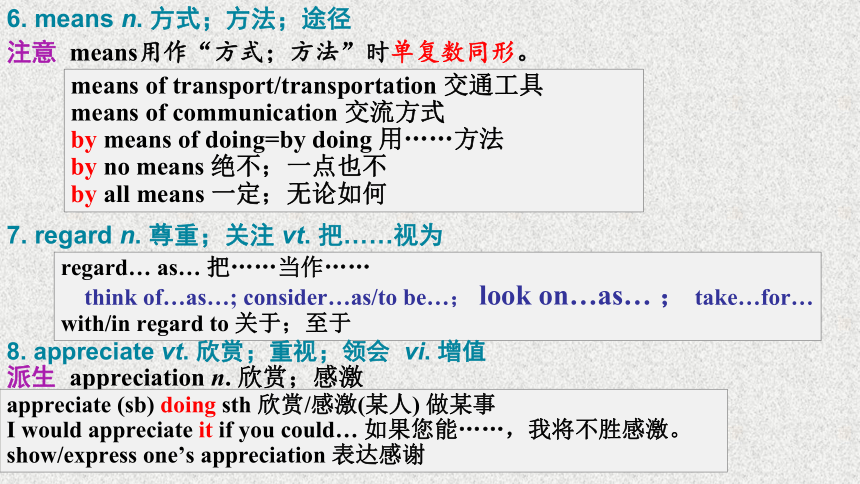
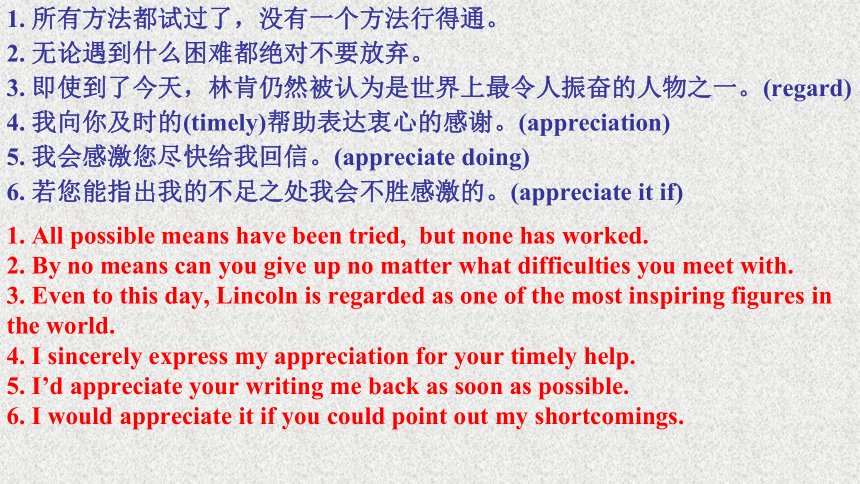
文档简介
(共16张PPT)
Revision: 必修一
Unit 5 Languages Around the World
高三一轮复习
重点词汇讲解
positive/negative attitude to/towards sth.对某事的积极/消极态度
1. attitude n. 态度;看法
搭配
比较:altitude n. 海拔,高度
2. refer vi. 提到;参考;查阅 vt. 查询;叫……求助于
(refer-referred-referred)
派生 reference n. 参考;指称关系
refer to 指的是;描述;查阅;提到
refer to the dictionary (= look up the word in the dictionary) 查字典
refer to…as… 把……称作……
refer to the people who work in the offices as white-collar workers
reference book 参考书;工具书
3. base vt. 以……为据点;以……为基础 n. 底部;根据
派生 basic adj. 基本的;基础的
basis n. 基础;根据;准则(bases)
base A on B A以B为基础
be based on/upon 以……为基础/依据
on the basis of sth (或on the basis that…) 在……的基础上
1. No matter what happens, Charles always adopts a positive attitude to/towards life.
2. He had been well prepared for the speech so that he didn’t refer to his notebook
while delivering a speech.
3. A good parent-children relationship should be set up on the basis of
understanding and respecting each other.
4. Based on my own experience, you will master a language much faster if you use it
as much as possible.
1. 不管发生什么,Charles总是对生活持积极的态度。(attitude)
2. 他已经为演讲做了充分的准备,所以演讲时他不用看笔记。(refer to)
3. 好的亲子关系应该建立在互相理解互相尊重的基础上。(basis)
4. 根据我自己的经验,如果你尽可能多地使用语言,你掌握它就快得多。(base)
a variety of = varieties of=various=all kinds of各种各样的
vary from… to…从……到……不等;在……到……之间变动
vary in… 在……方面不同
for various reasons 由于种种原因
4. variety n. 多样化;异体
搭配
派生 various adj. 各种各样的;不同的
词根 vary vi. 变化;变异 vt. 改变;使多样化
5. major n. 主修课程;主修学生 adj. 主要的;重要的 vi.主修
派生 majority n. 大多数;大半
反义 minor adj. 较小的;次要的
minority n.少数,少数派;少数民族,少数派;
major in主修;以……为专业
the/a majority of+名词 大多数……(做主语时,谓语一般用复数)
in the majority构成大多数/大部分
(1) The research team is made up of scientists, whose ages vary from 35 to 50.
(2) We thought up a variety of ways to overcome the difficulties.
(3) He inspires me to major in English at college, to be a bridge between China and the world.
(4) The majority of the students in this class are early birds.
1. 这个研究团队由35到50岁之间的科学家组成。(vary)
2. 我们想出各种方法来克服困难。(variety)
3. 他激励我大学主修英语,成为中国与世界的桥梁。(major)
4. 这个班的大多数学生都是早起的人。(majority)
6. means n. 方式;方法;途径
注意 means用作“方式;方法”时单复数同形。
means of transport/transportation 交通工具
means of communication 交流方式
by means of doing=by doing 用……方法
by no means 绝不;一点也不
by all means 一定;无论如何
7. regard n. 尊重;关注 vt. 把……视为
regard… as… 把……当作……
think of…as…; consider…as/to be…; look on…as… ; take…for…
with/in regard to 关于;至于
8. appreciate vt. 欣赏;重视;领会 vi. 增值
派生 appreciation n. 欣赏;感激
appreciate (sb) doing sth 欣赏/感激(某人) 做某事
I would appreciate it if you could… 如果您能……,我将不胜感激。
show/express one’s appreciation 表达感谢
1. All possible means have been tried, but none has worked.
2. By no means can you give up no matter what difficulties you meet with.
3. Even to this day, Lincoln is regarded as one of the most inspiring figures in the world.
4. I sincerely express my appreciation for your timely help.
5. I’d appreciate your writing me back as soon as possible.
6. I would appreciate it if you could point out my shortcomings.
1. 所有方法都试过了,没有一个方法行得通。
2. 无论遇到什么困难都绝对不要放弃。
3. 即使到了今天,林肯仍然被认为是世界上最令人振奋的人物之一。(regard)
4. 我向你及时的(timely)帮助表达衷心的感谢。(appreciation)
5. 我会感激您尽快给我回信。(appreciate doing)
6. 若您能指出我的不足之处我会不胜感激的。(appreciate it if)
9. struggle n. & vi. 奋斗;斗争;搏斗
struggle for… 为……而努力
struggle against/with sb./sth. 与……进行斗争
10. demand n. 要求;需求 vt. 强烈要求;需要 vi. 查问
派生 demanding adj. 要求高的;费力的;苛求的;难满足的
in(great) demand 需求大;抢手
meet/satisfy one’s demands 满足某人的需求
demand for… 对……的需求
demand that sb (should) do sth 强烈要求某人做某事
demand to do sth 要求做某事
11. relate vt. 联系;讲述
派生 relative n. 亲戚 adj. 相对的
relation n. 关系;亲属
relationship n. 关系;联系
relate sth to sth 把某物和某物联系起来
be related to 与……有关
relate to 与……有关;涉及;谈到
1. We should help those who are still struggling for survival.
2. She demanded that he (should) immediately return the books he borrowed from her.
3. The company should try to meet customers’ demands for products.
4. The topic being discussed is related to social events and history.
5. There is no denying that a close relationship between China and western countries would further promote our economy.
1. 我们应该帮助那些挣扎求生存的人。
2. 她要求他马上归还借她的书。
3. 公司应该尽力满足顾客对产品的要求。
4. 正在讨论的话题和社会事件和历史有关。
5. 不能否认,中西方紧密的关系会进一步促进我们的经济发展。
12. date back (to…) 追溯到
date back to =date from追溯到;始于
out of date 过时的
up to date最新的,现代的,跟上时代的
to date 迄今为止
(1) Every day a great number of tourists come and visit the ancient town, which _______________________ (追溯到) as early as 500 years ago.
(2) I want to buy a new dress because this one is __________ (过时的).
(3) Harry Potter is the most wonderful novel I ___________ (read) to date.
dates back to/dates from
out of date
have read
一词多义
( ) (1) Smoking is one of the major causes of cancer.
请给下列句中画线词选择一个恰当的汉语意思。
1. major A. adj. 主要的;重大的 B. n. 主修课程
C. n. 主修学生 D. vi. 主修;专门研究
A
吸烟是引发癌症的主要原因之一。
( ) (2) He majored in finance at university and is now working in a bank.
( ) (3) I think I should change my major to French.
( ) (4) Sam, an English major, is member of the college basketball team.
D
他在大学时主修金融,现在在一家银行工作。
B
我想把专业改成法语。
C
山姆,英语专业的学生,是一名大学篮球队队员。
( ) (1) You can refer to a dictionary if necessary.
( ) (2) He was punished because of that matter, so don’t refer to it again.
( ) (3) This passage refers to the events of last year.
C
B
如果有必要,你可以参考字典。
他因为那件事被罚了,所以不要再提它了。
2. refer to A. 指;描述 B. 提到 C. 查阅
A
这篇文章描述的是去年发生的事。
3. classic A. adj. 传统的; 古典的 B. adj. 典型的
C. n. 经典作品;名著
( ) (1) These are classic designs which will fit in well anywhere.
( ) (2) Her daughter likes reading the classics of Chinese literature.
( ) (3) He’s a classic example of a kid who’s clever but lazy.
A
C
这是些百搭的传统图案。
她女儿喜欢读中国古典文学名著。
B
他是个典型的聪明却懒惰的孩子。
写作句型仿写
1. (P62) Over the years, the system developed into different forms, as it was a time when people were divided geographically, leading to many varieties of dialects and characters. 在随后的年代里,这一体系发展成不同的形式, 这是由于当时中国人居住地域的分隔, 从而导致不同方言和汉字变体的产生。
句型 That/This/It was a time when… 这/那是……的时期
There was a time when… 曾经有段时间……
1. 那是一段人们不太关注健康的时期。
2. 我小时候,曾有一段时间天天跟朋友去钓鱼。
1. It was a time when people didn’t pay much attention to their health.
2. When I was a kid, there was a time when I went to fish with my friends every day.
2. (P62) Even today, no matter where Chinese people live or what dialect they speak, they can all still communicate in writing. 即使在今天,不论住在哪里, 也不论说何种方言, 中国人仍然能通过书写(汉字) 进行交流。
句型 no matter where/what/who… 不论……;不管……
说明 在引导让步状语从句时, no matter +特殊疑问词 (who,
what, when, where等),相当于特殊疑问词+ever,可以互换。
1. No matter what/Whatever you say, I won’t believe you anymore.
2. No matter how/However difficult it is, I mean to finish the task ahead of schedule.
3. No matter where/ Wherever we are, we shall not forget our motherland.
(1) 无论你说什么,我都不会再信你。
(2) 无论有多么困难,我都打算提前完成任务。
(3) 无论我们在哪里,都不要忘了我们的祖国。
Revision: 必修一
Unit 5 Languages Around the World
高三一轮复习
重点词汇讲解
positive/negative attitude to/towards sth.对某事的积极/消极态度
1. attitude n. 态度;看法
搭配
比较:altitude n. 海拔,高度
2. refer vi. 提到;参考;查阅 vt. 查询;叫……求助于
(refer-referred-referred)
派生 reference n. 参考;指称关系
refer to 指的是;描述;查阅;提到
refer to the dictionary (= look up the word in the dictionary) 查字典
refer to…as… 把……称作……
refer to the people who work in the offices as white-collar workers
reference book 参考书;工具书
3. base vt. 以……为据点;以……为基础 n. 底部;根据
派生 basic adj. 基本的;基础的
basis n. 基础;根据;准则(bases)
base A on B A以B为基础
be based on/upon 以……为基础/依据
on the basis of sth (或on the basis that…) 在……的基础上
1. No matter what happens, Charles always adopts a positive attitude to/towards life.
2. He had been well prepared for the speech so that he didn’t refer to his notebook
while delivering a speech.
3. A good parent-children relationship should be set up on the basis of
understanding and respecting each other.
4. Based on my own experience, you will master a language much faster if you use it
as much as possible.
1. 不管发生什么,Charles总是对生活持积极的态度。(attitude)
2. 他已经为演讲做了充分的准备,所以演讲时他不用看笔记。(refer to)
3. 好的亲子关系应该建立在互相理解互相尊重的基础上。(basis)
4. 根据我自己的经验,如果你尽可能多地使用语言,你掌握它就快得多。(base)
a variety of = varieties of=various=all kinds of各种各样的
vary from… to…从……到……不等;在……到……之间变动
vary in… 在……方面不同
for various reasons 由于种种原因
4. variety n. 多样化;异体
搭配
派生 various adj. 各种各样的;不同的
词根 vary vi. 变化;变异 vt. 改变;使多样化
5. major n. 主修课程;主修学生 adj. 主要的;重要的 vi.主修
派生 majority n. 大多数;大半
反义 minor adj. 较小的;次要的
minority n.少数,少数派;少数民族,少数派;
major in主修;以……为专业
the/a majority of+名词 大多数……(做主语时,谓语一般用复数)
in the majority构成大多数/大部分
(1) The research team is made up of scientists, whose ages vary from 35 to 50.
(2) We thought up a variety of ways to overcome the difficulties.
(3) He inspires me to major in English at college, to be a bridge between China and the world.
(4) The majority of the students in this class are early birds.
1. 这个研究团队由35到50岁之间的科学家组成。(vary)
2. 我们想出各种方法来克服困难。(variety)
3. 他激励我大学主修英语,成为中国与世界的桥梁。(major)
4. 这个班的大多数学生都是早起的人。(majority)
6. means n. 方式;方法;途径
注意 means用作“方式;方法”时单复数同形。
means of transport/transportation 交通工具
means of communication 交流方式
by means of doing=by doing 用……方法
by no means 绝不;一点也不
by all means 一定;无论如何
7. regard n. 尊重;关注 vt. 把……视为
regard… as… 把……当作……
think of…as…; consider…as/to be…; look on…as… ; take…for…
with/in regard to 关于;至于
8. appreciate vt. 欣赏;重视;领会 vi. 增值
派生 appreciation n. 欣赏;感激
appreciate (sb) doing sth 欣赏/感激(某人) 做某事
I would appreciate it if you could… 如果您能……,我将不胜感激。
show/express one’s appreciation 表达感谢
1. All possible means have been tried, but none has worked.
2. By no means can you give up no matter what difficulties you meet with.
3. Even to this day, Lincoln is regarded as one of the most inspiring figures in the world.
4. I sincerely express my appreciation for your timely help.
5. I’d appreciate your writing me back as soon as possible.
6. I would appreciate it if you could point out my shortcomings.
1. 所有方法都试过了,没有一个方法行得通。
2. 无论遇到什么困难都绝对不要放弃。
3. 即使到了今天,林肯仍然被认为是世界上最令人振奋的人物之一。(regard)
4. 我向你及时的(timely)帮助表达衷心的感谢。(appreciation)
5. 我会感激您尽快给我回信。(appreciate doing)
6. 若您能指出我的不足之处我会不胜感激的。(appreciate it if)
9. struggle n. & vi. 奋斗;斗争;搏斗
struggle for… 为……而努力
struggle against/with sb./sth. 与……进行斗争
10. demand n. 要求;需求 vt. 强烈要求;需要 vi. 查问
派生 demanding adj. 要求高的;费力的;苛求的;难满足的
in(great) demand 需求大;抢手
meet/satisfy one’s demands 满足某人的需求
demand for… 对……的需求
demand that sb (should) do sth 强烈要求某人做某事
demand to do sth 要求做某事
11. relate vt. 联系;讲述
派生 relative n. 亲戚 adj. 相对的
relation n. 关系;亲属
relationship n. 关系;联系
relate sth to sth 把某物和某物联系起来
be related to 与……有关
relate to 与……有关;涉及;谈到
1. We should help those who are still struggling for survival.
2. She demanded that he (should) immediately return the books he borrowed from her.
3. The company should try to meet customers’ demands for products.
4. The topic being discussed is related to social events and history.
5. There is no denying that a close relationship between China and western countries would further promote our economy.
1. 我们应该帮助那些挣扎求生存的人。
2. 她要求他马上归还借她的书。
3. 公司应该尽力满足顾客对产品的要求。
4. 正在讨论的话题和社会事件和历史有关。
5. 不能否认,中西方紧密的关系会进一步促进我们的经济发展。
12. date back (to…) 追溯到
date back to =date from追溯到;始于
out of date 过时的
up to date最新的,现代的,跟上时代的
to date 迄今为止
(1) Every day a great number of tourists come and visit the ancient town, which _______________________ (追溯到) as early as 500 years ago.
(2) I want to buy a new dress because this one is __________ (过时的).
(3) Harry Potter is the most wonderful novel I ___________ (read) to date.
dates back to/dates from
out of date
have read
一词多义
( ) (1) Smoking is one of the major causes of cancer.
请给下列句中画线词选择一个恰当的汉语意思。
1. major A. adj. 主要的;重大的 B. n. 主修课程
C. n. 主修学生 D. vi. 主修;专门研究
A
吸烟是引发癌症的主要原因之一。
( ) (2) He majored in finance at university and is now working in a bank.
( ) (3) I think I should change my major to French.
( ) (4) Sam, an English major, is member of the college basketball team.
D
他在大学时主修金融,现在在一家银行工作。
B
我想把专业改成法语。
C
山姆,英语专业的学生,是一名大学篮球队队员。
( ) (1) You can refer to a dictionary if necessary.
( ) (2) He was punished because of that matter, so don’t refer to it again.
( ) (3) This passage refers to the events of last year.
C
B
如果有必要,你可以参考字典。
他因为那件事被罚了,所以不要再提它了。
2. refer to A. 指;描述 B. 提到 C. 查阅
A
这篇文章描述的是去年发生的事。
3. classic A. adj. 传统的; 古典的 B. adj. 典型的
C. n. 经典作品;名著
( ) (1) These are classic designs which will fit in well anywhere.
( ) (2) Her daughter likes reading the classics of Chinese literature.
( ) (3) He’s a classic example of a kid who’s clever but lazy.
A
C
这是些百搭的传统图案。
她女儿喜欢读中国古典文学名著。
B
他是个典型的聪明却懒惰的孩子。
写作句型仿写
1. (P62) Over the years, the system developed into different forms, as it was a time when people were divided geographically, leading to many varieties of dialects and characters. 在随后的年代里,这一体系发展成不同的形式, 这是由于当时中国人居住地域的分隔, 从而导致不同方言和汉字变体的产生。
句型 That/This/It was a time when… 这/那是……的时期
There was a time when… 曾经有段时间……
1. 那是一段人们不太关注健康的时期。
2. 我小时候,曾有一段时间天天跟朋友去钓鱼。
1. It was a time when people didn’t pay much attention to their health.
2. When I was a kid, there was a time when I went to fish with my friends every day.
2. (P62) Even today, no matter where Chinese people live or what dialect they speak, they can all still communicate in writing. 即使在今天,不论住在哪里, 也不论说何种方言, 中国人仍然能通过书写(汉字) 进行交流。
句型 no matter where/what/who… 不论……;不管……
说明 在引导让步状语从句时, no matter +特殊疑问词 (who,
what, when, where等),相当于特殊疑问词+ever,可以互换。
1. No matter what/Whatever you say, I won’t believe you anymore.
2. No matter how/However difficult it is, I mean to finish the task ahead of schedule.
3. No matter where/ Wherever we are, we shall not forget our motherland.
(1) 无论你说什么,我都不会再信你。
(2) 无论有多么困难,我都打算提前完成任务。
(3) 无论我们在哪里,都不要忘了我们的祖国。
